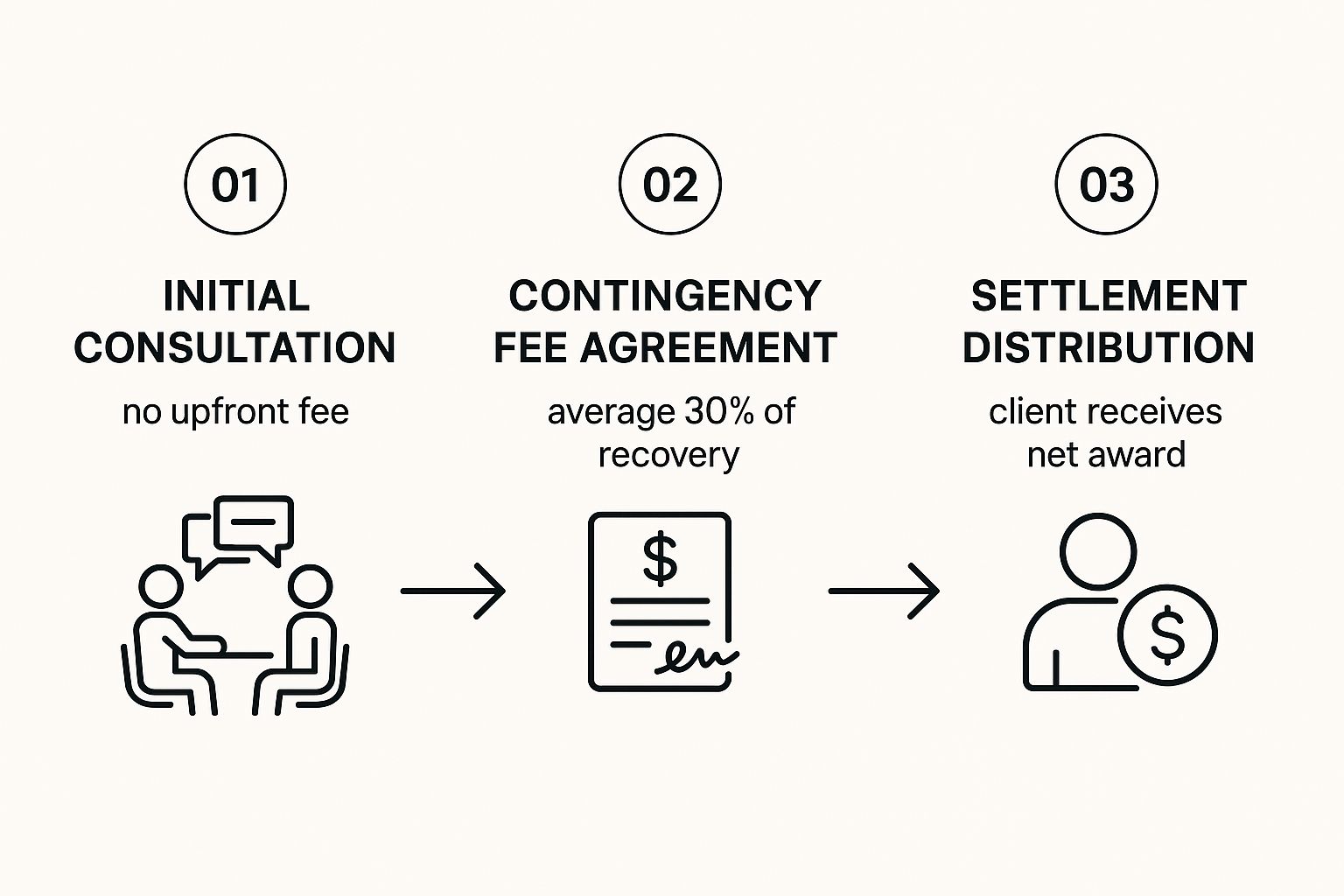Hiring a Personal Injury Attorney in Oregon
"I was satisfied once John Bell took over my case."
"Communication was always timely."
Hiring a Personal Injury Attorney in Oregon
After you’ve been injured, hiring a personal injury attorney isn't just another item on your to-do list. It's the single most important step you can take to level a playing field that is, frankly, rigged against you from the start. A good lawyer is your advocate, your strategist, and your shield against insurance companies that have one goal: paying you as little as possible.
This lets you focus on what actually matters—your recovery—while a professional handles the legal fight.
Why the Right Oregon Attorney Is a Game Changer
Let's be real: the aftermath of an accident is overwhelming. You’re juggling doctor's appointments, trying to heal, and watching medical bills pile up while you're out of work. The absolute last thing you need is the added stress of sparring with an insurance adjuster who is trained to poke holes in your story and devalue your claim.
This is precisely where an experienced personal injury attorney proves their worth.
Picture a classic Oregon winter storm causing a multi-car pileup on I-5. It's a chaotic mess. Everyone has a different story, and visibility was terrible. Who’s at fault? A skilled attorney knows exactly how to cut through that confusion. They get to work immediately, preserving evidence that can disappear fast—like securing a commercial truck's black box data before it's erased or subpoenaing traffic camera footage before it’s recorded over. They’ll even bring in accident reconstruction experts to piece together the truth.
Beyond Courtroom Drama
Most people think of lawyers and picture dramatic courtroom battles. The reality is, most of the crucial work happens long before a trial is even on the table. Your attorney is an investigator and a negotiator first and foremost. Their job is to build a case so strong that the insurance company has no choice but to offer a fair settlement.
This involves a few key things:
- Calculating Your Full Damages: A good lawyer looks beyond just your current medical bills. They calculate future medical needs, lost earning capacity for the rest of your career, and the very real cost of your pain and suffering.
- Managing Strict Deadlines: Oregon has what’s called a statute of limitations. It’s a non-negotiable deadline for filing a lawsuit. If you miss it, your right to seek compensation is gone forever.
- Leveraging Deep Legal Knowledge: They understand the complex nuances of Oregon’s comparative negligence laws and exactly how those rules will apply to the specific details of your accident.
To really grasp how much of an impact a lawyer can have, it helps to start with a solid understanding of personal injury law. This background knowledge makes it clear just how much value they bring to your corner.
The right attorney doesn't just represent you; they completely shift the power dynamic. They make sure your voice is heard and your rights are protected when you’re up against a massive insurance corporation.
The financial stakes here are enormous. Consider that top firms in the U.S. have recovered staggering amounts for their clients. Morgan & Morgan, for example, has secured over $25 billion for clients across more than 700,000 cases. Other firms have won single verdicts as high as $47 million for catastrophic injuries. These numbers aren’t just statistics; they show what’s possible when you have a true expert fighting for you.
Finding and Vetting the Right Attorney

Knowing you need a lawyer is one thing, but actually finding the right one can feel overwhelming. A quick Google search will throw a hundred names at you, but how do you know who is actually a good fit? You need a real strategy.
The goal here is to sift through that noise and create a shortlist of highly qualified attorneys you'd feel confident interviewing.
A great place to start is with trusted, local resources. The Oregon State Bar actually has a referral service that can point you to attorneys in good standing who focus on personal injury law right in your community. That's a much better starting point than a random search engine result.
From there, you can turn to well-regarded legal directories. Sites like Avvo or Martindale-Hubbell are fantastic because they offer profiles, peer ratings, and, most importantly, reviews from past clients. This gives you a much fuller picture of an attorney's reputation and track record.
Look Deeper Than a Fancy Website
Once you've got a handful of names, it's time to do some real digging. A law firm's website is their digital storefront, and it tells you a lot about their priorities.
Here’s what you should be looking for:
- A Clear Focus: Do they live and breathe personal injury law, or is it just one item on a long list of services? A dedicated firm will have a much deeper knowledge of the nuances of your specific situation.
- Proof of Results: Any good firm will have a section showcasing their verdicts and settlements. Past results don't guarantee a future outcome, of course, but they prove the attorney can deliver.
- Real Client Stories: Pay close attention to testimonials. Do they feel genuine and specific, or are they vague and sound like they were written by a marketing team? Authentic reviews tell you a lot about how an attorney treats their clients.
It's also worth noting how lawyers manage their online reputation, as a proactive and professional online presence often reflects a well-run, client-focused practice.
Your main goal in this stage is to find hard evidence of proven experience with cases just like yours. If you were hit by a commercial truck, you don't want a lawyer who only handles fender-benders; you need someone who has gone toe-to-toe with big trucking companies and won.
Building Your Shortlist
As you vet each firm, your initial long list will naturally start to shrink. You're looking for consistency. Do the glowing reviews on their website match what people are saying on independent review sites? Does their proclaimed specialty line up with the case results they feature?
By the time you're done, you should have narrowed it down to three to five attorneys who seem like a genuinely strong fit. These are the people you’ll call to schedule an initial consultation.
This methodical approach turns a daunting task into a series of manageable steps. For an even deeper dive into this process, our guide on how to find a personal injury lawyer has more valuable insights.
Navigating Your First Legal Consultation

Think of your first meeting with a potential lawyer as a two-way interview. You’re telling your story, but you’re also sizing them up. Most personal injury attorneys in Oregon offer a free consultation, which gives you a no-risk opportunity to find the right fit for your case and, just as importantly, for your personality.
The key to a productive meeting is preparation. Your goal is to give the attorney a clear, concise picture of what happened so they can give you a realistic assessment. This is your chance to get a feel for their experience, how they communicate, and the strategic approach they might take.
What to Bring With You
Walking into a consultation with an organized folder of documents sends a powerful message. It shows you’re serious and helps the attorney get right to the heart of the matter, saving you both a lot of time.
Try to pull together as many of these items as possible:
- The Official Police Report: This is often the starting point, as it contains the basic, unbiased facts of the accident from a law enforcement perspective.
- Photos and Videos: Don't underestimate the power of visual evidence. Gather any pictures of the accident scene, vehicle damage, and your injuries. If they have timestamps, even better.
- Medical Documentation: Bring along any hospital discharge papers, doctor's notes, treatment plans, and medical bills you've collected so far.
- Insurance Communications: Any emails, letters, or claim-denial notices from an insurance company are crucial. They tell part of the story that other documents can't.
If you can't find everything, don't sweat it. A good attorney's office can track down missing documents. But the more you can provide upfront, the sharper their initial analysis will be.
Remember, this consultation is a two-way street. You aren't just there to lay out the facts. You're there to see how this person listens, what kinds of questions they ask, and whether you feel confident putting your future in their hands.
It's a critical first step, especially when you consider the numbers. In the U.S., there are roughly 39.5 million personal injury incidents that require medical attention each year. And while that number is staggering, what’s more telling is that about 95-96% of these cases settle out of court. This highlights just how vital your attorney's negotiation skills are. You can get a deeper look at these figures in this detailed statistical breakdown.
Questions That Get Real Answers
Beyond just handing over your documents, you need to ask the right questions to understand how this lawyer and their firm actually operate. You're looking for direct, honest answers—vagueness is a major red flag.
To help you evaluate a potential attorney, here is a list of essential questions. This table is designed to help you prepare for your consultation and understand what to listen for in their responses.
Key Questions for Your Attorney Consultation
| Experience & Specialization | "How many cases like mine have you personally handled?" | Look for specific examples, not just a general number. Ask about outcomes in cases involving similar injuries or accident types (e.g., commercial trucks, motorcycle accidents). |
| Case Management | "Who will be my day-to-day contact? Will it be you, a paralegal, or an associate?" | There's no single "right" answer, but you need to know who you'll be talking to. You want a clear line of communication. |
| Firm Resources | "What is your firm's typical caseload? How do you ensure my case gets the attention it needs?" | You're listening for reassurance that they aren't so overloaded that your case will fall through the cracks. Ask about their team structure. |
| Strategy & Assessment | "Based on what I've shared, what is your honest, initial assessment of my case?" | A good lawyer will give you a candid opinion of potential strengths and weaknesses without making wild promises or guaranteeing a specific dollar amount. |
| Fees & Costs | "Can you walk me through your fee structure and any case costs I might be responsible for?" | They should clearly explain their contingency fee percentage and how costs (like expert witnesses or court filing fees) are handled. |
Asking these questions directly will tell you a lot about their transparency, experience, and how they treat their clients. The answers you get are often just as important as the documents you bring.
Decoding Attorney Fees and Contracts
Let's talk about money. It's often the biggest worry for people after an accident, but understanding how personal injury lawyers get paid should put you at ease. The good news is, you almost never have to pay a dime out of your own pocket to hire an attorney. Why? Because the vast majority of us work on what’s called a contingency fee basis.
Put simply, this means the lawyer's fee is contingent on winning your case. If they don't get you a settlement or a win in court, you owe them nothing for their time. This system is what gives everyone, regardless of their bank account, a fair shot at justice.
Understanding the Contingency Fee Percentage
When you find the right attorney, you'll sign a fee agreement that outlines the specific percentage of the final settlement they will receive as payment. In Oregon, this number usually lands somewhere between 33% to 40%. So, if your case settles for $100,000, a 33.3% fee means the attorney would receive $33,333.
That fee covers a lot more than just the lawyer's time. It pays for their legal team's work, the firm's overhead, and the significant financial risk they take on. They might pour hundreds of hours into your case with absolutely no guarantee of ever getting paid for it.
The infographic below gives a clear picture of how this process generally works.

As you can see, it’s designed so you don't have to worry about upfront costs. Payment only happens if and when your attorney secures a financial recovery for you.
Don't Forget About Case Expenses
Beyond the attorney's percentage, every lawsuit comes with its own set of costs, which we call case expenses. Think of these as the funds the law firm fronts to build the strongest case possible for you.
What do these expenses typically include?
- Expert Witness Fees: Hiring a doctor or an accident reconstruction expert to provide testimony can be pricey but invaluable.
- Court Filing Fees: The court charges fees just to file the initial lawsuit and subsequent motions.
- Deposition Costs: You have to pay for court reporters and sometimes videographers to officially record sworn testimony.
- Record Retrieval: Gathering all your medical records and the official police reports isn't free.
These costs can easily run into the thousands of dollars, so it’s essential to know exactly how your attorney handles them.
If you ask only one question about the fee agreement, make it this one: "Are case expenses taken out before or after your percentage is calculated?" This one little detail can make a difference of thousands of dollars in your pocket.
Let's break it down with a quick example.
Say you have a $100,000 settlement, a 33.3% fee agreement, and $10,000 in case expenses.
| Expenses Deducted Before Fees | $100,000 - $10,000 (expenses) = $90,000.Attorney fee: $90,000 x 33.3% = $30,000. | $60,000 |
| Expenses Deducted After Fees | Attorney fee: $100,000 x 33.3% = $33,333.$100,000 - $33,333 (fee) - $10,000 (expenses). | $56,667 |
As the table shows, the first method is clearly better for you. Any reputable attorney will walk you through their contract and explain this clearly. Never sign anything until you've read the fee agreement from top to bottom and feel 100% comfortable with every single term. Your financial peace of mind is what matters most.
Making the Right Choice for Your Case

Alright, you’ve met with a few attorneys. Now comes the hard part: making the final call. This decision goes way beyond comparing win-loss records or settlement amounts. You're choosing a partner who will guide you through what can be a very stressful and lengthy process.
Pull out the notes you took during your consultations, but don't ignore your gut feeling. Who made you feel at ease? Who took the time to explain things clearly, without hiding behind a wall of confusing legal jargon?
That personal connection is everything. You're going to be sharing deeply personal information about your health and finances, so you need to trust this person completely.
It might feel overwhelming, especially when you consider the sheer size of the personal injury industry—valued at around $61.7 billion in 2025. That number tells you one thing: a lot of people have been in your shoes. With so many lawyers out there, finding the right personal and professional fit is what makes all the difference.
Reviewing the Attorney-Client Agreement
Before you sign on the dotted line, you'll get an attorney-client agreement. This is a binding contract, so take your time and read every single word. Don't let anyone rush you through it.
Make sure you're crystal clear on a few key things:
- The Contingency Fee: Is the exact percentage spelled out?
- Case Expenses: How are costs like expert witness fees or court filing fees handled? Are they taken out before or after the attorney's fee is calculated? This matters.
- Communication: What's the firm's policy for keeping you in the loop?
If anything seems confusing, ask for clarification. A good attorney will have no problem walking you through the agreement until you're 100% comfortable. For a deeper dive, our post on https://www.belllawoffices.com/how-to-choose-a-personal-injury-lawyer/ offers some great pointers.
Trust your intuition. A lawyer’s impressive case history means little if you don't feel heard, respected, and confident in their ability to represent you personally. The right choice is a blend of proven skill and genuine rapport.
Once you’ve made your choice and signed the paperwork, your attorney gets to work right away. The first thing they'll do is send a letter of representation to the insurance companies. This is a big deal. It tells the insurance adjusters to stop contacting you and direct all communication to your lawyer's office.
Instantly, the harassing phone calls and endless paperwork stop.
From that point on, your legal team takes over the heavy lifting of gathering evidence and building your case. Knowing a bit about navigating the personal injury claim process can help you understand the road ahead. But for now, you can finally take a breath. You've got an expert in your corner.
Common Questions About Hiring an Attorney
It's totally normal to have questions swirling around even after you've done your homework and met with a few lawyers. Choosing someone to represent you is a big decision, especially when you're doing it for the first time. Let's tackle some of the most frequent concerns people have.
How Soon After an Accident Should I Hire a Lawyer?
The short and simple answer? As soon as you possibly can.
While Oregon gives you two years to file most injury claims (the statute of limitations), the real race is against the clock for evidence. In the days and weeks after a crash, crucial proof can vanish for good.
Getting an attorney on board right away means they can immediately:
- Secure surveillance footage from traffic lights or nearby businesses before it gets recorded over.
- Talk to witnesses while the details are still crystal clear in their minds.
- Professionally document the accident scene before weather or time changes things.
Just as importantly, they'll handle all communication with the insurance companies from the get-go. This stops you from accidentally saying something an adjuster could twist and use to devalue your claim later on.
What if My Injuries Seem Minor at First?
This is a classic—and potentially costly—mistake. Injuries like concussions or whiplash often don't show their true colors right away. Symptoms can pop up or get much worse days, or even weeks, later, sometimes leading to chronic pain and long-term medical care.
Insurance adjusters know this, which is why they love to dangle a quick, lowball settlement offer in front of you.
Never, ever accept a settlement offer until your medical treatment is complete. A good lawyer will insist you get a full medical workup to understand the true scope of your injuries. This ensures your settlement accounts for any future care you might need.
Even if you feel mostly okay, a free consultation is a smart move. It gives you a professional take on what your claim could be worth and protects you from leaving money on the table.
Can I Switch Attorneys if I'm Not Satisfied?
Yes, you absolutely have the right to change lawyers at any point. But it's not a decision to take lightly. Your first attorney will almost certainly place a lien on your case for the work and money they've already put into it, which gets paid out from your final settlement.
Before you jump ship, try having an honest talk with your current lawyer about what's bothering you. Often, a simple breakdown in communication is the real problem and can be fixed. If that doesn't solve it, make sure you have a new attorney ready to go who can clearly explain how the transition and the lien will work.
For more in-depth answers on topics like this, feel free to explore our personal injury FAQs.
What Happens if I Was Partially at Fault in Oregon?
This is where Oregon's "modified comparative negligence" rule comes into play. In plain English, it means you can still get compensation as long as you are found to be 50% or less at fault for what happened.
How it works is simple: your final award is just reduced by your percentage of fault. For instance, if you were found to be 20% responsible for an accident with $100,000 in damages, you could still recover $80,000.
A huge part of your attorney's job in these cases is to build the strongest argument possible to minimize your share of the blame, which directly maximizes the compensation you receive.
At Bell Law, our experienced Oregon attorneys are here to answer all your questions and guide you through every step of your claim. If you need help, don't hesitate to reach out for a free, no-obligation consultation at https://www.belllawoffices.com.
Disclaimer: The information on this page is provided for general informational purposes only and is not legal advice. Reading this content does not create an attorney-client relationship. For advice about your specific situation, please contact a licensed attorney.







